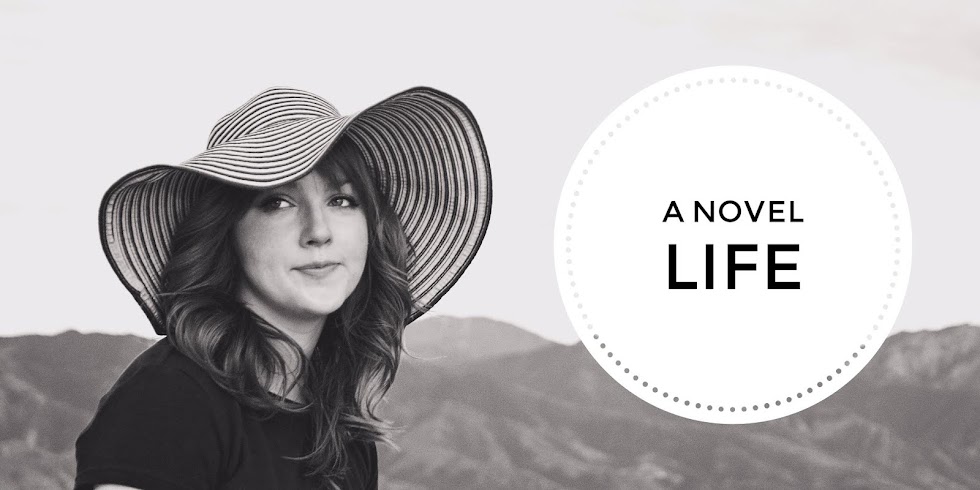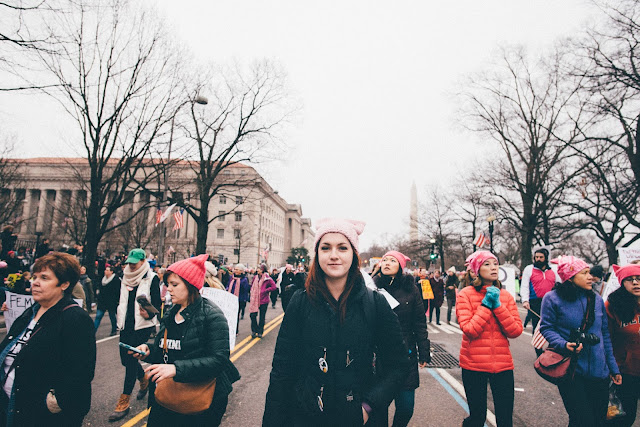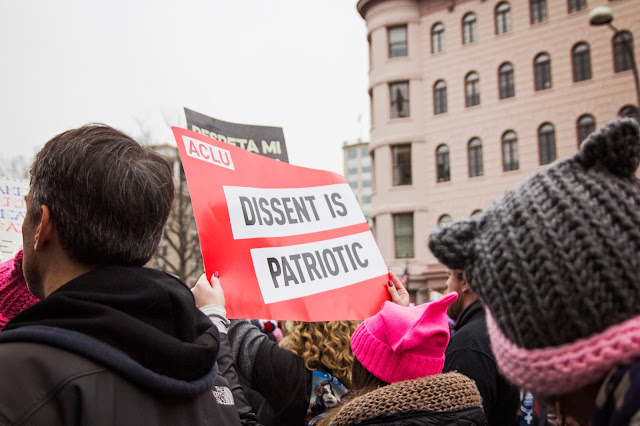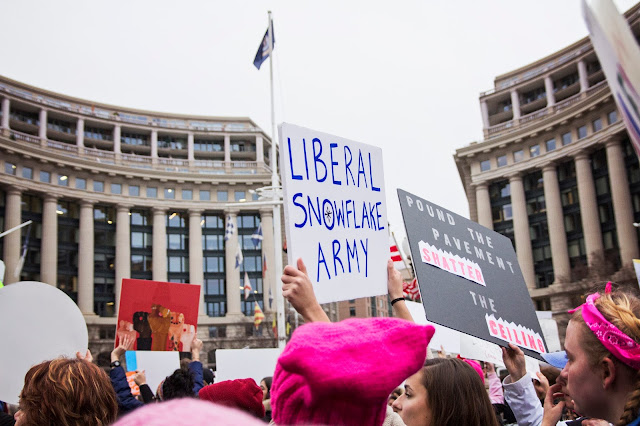Tuesday, February 28, 2017
Tuesday, January 24, 2017
Women's March on Washington: Reflection, Defense, and Photos
My own political beliefs have shifted dramatically over the last twelve months. For many years I identified as a “moderate”, the effective agnosticism of the political spectrum, allowing a me to avoid picking sides in elections and arguments. As the 2016 election began picking up steam in the primaries, I remained lukewarm on most topics. But as the year progressed and the election rhetoric became more divisive, I was forced to start forming opinions, examining each issue individually and deciding what I believed to be right about the matter. Starting with empathy for each individual human being and continuing with extensive research, I began to identify almost unanimously with the progressive stance on each matter.
This last weekend, I had the amazing opportunity to join the 500,000+ people gathered in Washington D.C. for the Women’s March on Washington. Despite warnings of rioters, standing in the crowd was an incredibly uplifting experience. It was surreal to be surrounded by hundreds of thousands of people who were passionate about women’s rights, environmental rights, minorities’ rights, immigration reform, healthcare reform, and the results of the recent presidential election. The sheer number of people gathered in one place caused cell phone coverage to effectively stop, shutting out anything social media had to say about the event and forcing me to stay present in the moment.
However, once the march was done, social media reflected a much different reaction to the march than I had expected. Rather than sentiments of awe or encouragement like those around me during the march, the movement which I so wholeheartedly support was met with condescension and disdain.
No movement is perfect. No democratic act is ideal as we are human and humanity is riddled with mistakes and failure. As a collective group, criticism is necessary to address flaws and adjust course as necessary. In the case of the Women’s March, organizers have demonstrated an immense amount of humility, addressing criticisms that the march is not intersectional enough or even at all.
In my own personal circles, there has been criticism that the Women’s March organization has excluded pro-life women from participating, an exaggeration that has been clarified: The Women’s March platform is pro-choice and they would not be including pro-life groups as sponsors or partners of the march, but pro-life groups and individuals were welcome to participate as the march. I do agree that the Women’s March’s handling of the pro-life partnership was not ideal. But for both the pro-life and pro-choice sides to speak ill of an entire movement because of disagreement on one of many important issues is childish and reactionary. The intent of both the pro-life and pro-choice groups has been to respect human life and autonomy. But the difference defining human life has caused a massive division between women and the continued tossing of insults over the last 40 years has accomplished nothing for either side.
That being said, the point of the Women’s March wasn’t to mend the controversy over abortion. The purpose was “… [to] stand together in solidarity with our partners and children for the protection of our rights, our safety, our health, and our families - recognizing that our vibrant and diverse communities are the strength of our country.”
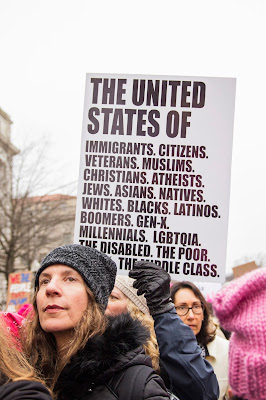 To see so many people for whom I care only concerned about the pro-choice stance of the March organizers was incredibly frustrating. Generally speaking, groups seeking to limit abortion in the United States have very little regard for other issues that impact women and their children after birth, including child care, education, affordable healthcare, mass incarceration, climate change, and college affordability. To my pro-life friends, family, and acquaintances, I must ask: how can you tell a woman she is obligated to be a mother when you don’t support building a country that does not limit a woman’s access to resources to provide for her child? How can you speak of removing affordable health care initiatives, of not raising minimum wage, of not paying the teachers a livable wage, of continuing to destroy the environment in which her child will grow up, of not educating her on her and her partner’s fertility and reproductive health, or of continuing a justice system that targets her child because of the color of their skin? How can you call yourself pro-life when you continue to support politicians and initiatives that kill our planet, shut out immigrants, and use the justice system as shelter for racism? That is not to be pro-life. That is to be ignorant.
To see so many people for whom I care only concerned about the pro-choice stance of the March organizers was incredibly frustrating. Generally speaking, groups seeking to limit abortion in the United States have very little regard for other issues that impact women and their children after birth, including child care, education, affordable healthcare, mass incarceration, climate change, and college affordability. To my pro-life friends, family, and acquaintances, I must ask: how can you tell a woman she is obligated to be a mother when you don’t support building a country that does not limit a woman’s access to resources to provide for her child? How can you speak of removing affordable health care initiatives, of not raising minimum wage, of not paying the teachers a livable wage, of continuing to destroy the environment in which her child will grow up, of not educating her on her and her partner’s fertility and reproductive health, or of continuing a justice system that targets her child because of the color of their skin? How can you call yourself pro-life when you continue to support politicians and initiatives that kill our planet, shut out immigrants, and use the justice system as shelter for racism? That is not to be pro-life. That is to be ignorant.
Across the internet, women have expressed not feeling as though they had a voice in the Women’s March since they “saw things differently.” But consistently, I found these women were given opportunities which many in America didn’t have. These opportunities include education, economic stability, and freedom to practice their religion. I struggled reading these accounts, as I also experienced these privileges. My parents were well educated and well employed, giving them the economic freedom to provide for my own health and education. I grew up Christian and was not persecuted for my religious practice. To paraphrase my mother, we now have an administration that expects everyone to pull themselves up by their bootstraps, but inherently ignores that massive groups of our country don’t have to boots to grab the straps. But to say that because I haven’t personally suffered in areas such as quality education or affordable healthcare I shouldn’t feel compelled to seek change in these areas is so incredibly naive. Should I not donate to the food bank because I am not personally hungry? Should I not donate to a homeless shelter because I have roof over my head? Of course not.
 Some of these same women have expressed lack of support due to the idea that feminism as an ideology suppresses their expression of femininity and desire to fit traditional female roles. To these women, I wonder what definition of femininity is being used. If femininity was defined as a pattern of women being weak and dependent on men, then yes, femininity is under attack. But to say that “traditional” feminine qualities such as emotional intelligence or the desire to nurture are under attack because they are not automatically expected of all women is to overlook the progress and purpose of feminism. The feminist intent is not to remove traditional femininity from our culture, but to broaden the definition to something more than just motherhood. Femininity with feminism includes qualities such as strength and the basic intelligence levels necessary to vote, hold property, and work if chosen. Feminism as an ideology does not seek to threaten your right to be a stay-at-home mother, but to protect it, allowing you to build your family and your life as you see fit.
Some of these same women have expressed lack of support due to the idea that feminism as an ideology suppresses their expression of femininity and desire to fit traditional female roles. To these women, I wonder what definition of femininity is being used. If femininity was defined as a pattern of women being weak and dependent on men, then yes, femininity is under attack. But to say that “traditional” feminine qualities such as emotional intelligence or the desire to nurture are under attack because they are not automatically expected of all women is to overlook the progress and purpose of feminism. The feminist intent is not to remove traditional femininity from our culture, but to broaden the definition to something more than just motherhood. Femininity with feminism includes qualities such as strength and the basic intelligence levels necessary to vote, hold property, and work if chosen. Feminism as an ideology does not seek to threaten your right to be a stay-at-home mother, but to protect it, allowing you to build your family and your life as you see fit.
And to the women who say that feminism isn’t necessary because it’s not as bad for women as it used to be or because the treatment of women in the United States isn’t as bad as other countries: didn’t we learn from this last election that the lesser of two evils isn’t inherently good?
My sorority sister, Emily, commented on not being affected by the wage, but wanting, “...respect, not for being a woman, but for being a human. I would like to feel safe walking alone. I would like to not feel guilty for saying no or having an opinion. I would like to not be called a whore for taking birth control. Or a bitch or any other awful thing you can think of. I would like to live in a country where our president never feels entitled to grab a woman because of their celebrity status. I would like to live in a country where someone convicted of rape actually serves their full sentence. I would like to live in a country where 1 in 5 women on college campuses aren't sexually assaulted. I would like to live in a country where victims of either sex felt comfortable enough to speak up and be asked only, 'are you okay?' I would like to live in a country where standing up for what you believe in peacefully isn't seen as whining. A country where we listen to understand rather than to reply.”
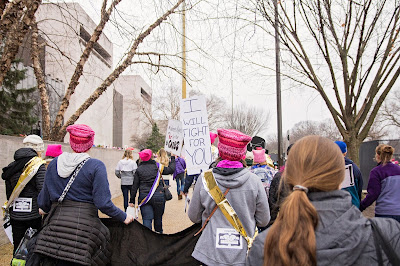 Finding a voice isn’t about identifying with every item on an organization’s agenda. The Women’s March has a broad agenda with several principles that will not be personally identifiable to every person. I highly doubt the March organizers expected every participant to personally say, “yes, this impacts me personally.” But just because you haven’t experienced a struggle doesn’t mean that your mothers, your aunts, your sisters, your cousins, your nieces, your girlfriends, or your daughters won’t encounter that struggle. Janet Mock stated in her Women’s March rally speech, “Our approach to freedom need not be identical but it must be intersectional and inclusive. It must extend beyond ourselves.”
Finding a voice isn’t about identifying with every item on an organization’s agenda. The Women’s March has a broad agenda with several principles that will not be personally identifiable to every person. I highly doubt the March organizers expected every participant to personally say, “yes, this impacts me personally.” But just because you haven’t experienced a struggle doesn’t mean that your mothers, your aunts, your sisters, your cousins, your nieces, your girlfriends, or your daughters won’t encounter that struggle. Janet Mock stated in her Women’s March rally speech, “Our approach to freedom need not be identical but it must be intersectional and inclusive. It must extend beyond ourselves.”
I bring these matters up not to incite argument or divisiveness, but rather to self check as others have helped me to self check my own beliefs and understanding of thing things around me. As explained by a Medium author, I too understand the fear of self-victimization. Standing up for yourself and for persons less fortunate than you does not make you a victim. It empowers you to participate in democracy. To march is to exercise first amendment rights like those who marched on Washington in 1963 during the Civil Rights Movement, like those who marched in the Woman Suffrage Parade in 1913, or those who demanded representation for taxation in the Boston Tea Party. To claim that the Women’s March on Washington is somehow inherently not impactful because it is not “useful” is to be ignorant of historical impact. Gloria Steinem stated in her Women’s March rally speech, "Sometimes we must put our bodies where our beliefs are. Sometimes pressing send is not enough." Of course there is more to do than make some snarky protest signs. There is a long road ahead, particularly given the current administration. Those who care for your rights and your earth will continue to fight.
Tuesday, October 13, 2015
Death
My childhood grew up almost completely void of death. I had
no pets that passed away besides a few fish. I had no teacher or pastor or
adult figure in my day to day life pass away. It wasn’t until I was ten years
old that my grandfather died of a sudden heart attack. And while I was sad and
going to visit my mother’s family was different from that point forward, my
grandfather was not a significant figure in my childhood. Visits to relatives
were sporadic. In fact, since my grandfather’s death, I’ve only gone back to my
mother’s home town twice. I think of my “Papaw” and while it is a little sad,
there is no real sense of loss.
I think I was sixteen when one of my close friends told me
her father had been diagnosed with cancer. I watched from a distance as she and
her family went through the devastating journey of chemotherapy and radiation.
While her father was cancer free for a short time, they soon found that his
cancer had returned and spread. Less than six months after my friend had
graduated from high school, her father passed away. I watched the hand of death
unfold from a far, and by the time of her father’s death, my friend and I had
gone our separate ways for post high school education. I was unable to attend
his funeral or partake in my friend’s grieving other than to offer weak
condolences.
Perhaps a year or so later, I remember wondering, “Why must
we have such a hard time talking about death? Why can’t our culture be more
open about the subject?” I look back at this thought and realize my own naivety
on the topic as a whole. I didn’t see a
problem with the topic because I hadn’t really been touched by that particular
piece of the life cycle. My own experiences with death had been peripheral, and
I had handled them by simply not addressing them on an emotional level at all. An
entire chapter of life experiences had not yet begun for me, not because of a
gap in my childhood, but simply a beautiful innocence that life events had not
yet spoiled.
This last week had been the second time I’ve seen my mother’s
family since my grandfather’s death. In the seven years since my last visit, my
grandmother’s health, both physical and mental, has deteriorated drastically.
The polio she contracted in her twenties had left her with limited mobility, now
worsened with age. The last time I saw her, my grandmother was still living in
the house in which my mother grew up. However, the early stages of Alzheimer’s
has progressed with no hesitation and age has caught up with my grandmother’s
feeble body. She is now in a memory care home down the street from the house
where she raised her children and grandchildren.
My mother, my brothers, and I visited her this last week at
the home. Upon entering her dim, simply furnished room, we found her curled up
on her bed, staring at the ceiling. With the decline her in mental function, my
grandmother had been put on heavy antipsychotics to limit violent behavior
affecting herself and those caring for her. Consequently, she exhibits very
little response to her surroundings. I watched, trying and failing to keep
tears at bay, as my own mother embraced my grandmother’s feeble body and
smoothed her long, wild hair. Over and over through tears my mother said, “I love
you, Mom. It’s so good to see you.” My mother talked about her own children,
three of whom my grandmother had not yet met.
It was in that moment that I realized with a very selfish
horror, someday, that would be me, holding my dying mother. I will be the one
with my own life and projects and maybe family while my parents will be leaving
me permanently. It is inevitable that I will have to watch their bodies and
minds leave at varying distasteful rates, leaving me to care for what is left
until it is gone. I hated the thought.
 I think death is often uncomfortable because it awakens a
selfishness in us. I don’t want to endure the pain of my parents die. I just
don’t. I don’t want the responsibilities of caring for my parents, of planning
their funerals, and of living life afterwards without them. They are hard and
often overwhelming tasks that demand physical, emotional, and financial
strength to give. That giving is hard and uncomfortable and is not rewarding
for the giver in a material sense. As I watched my mother hold my grandmother
for the short time that she could before having to return to her own children, I
witnessed an incredible selflessness. Holding her hand, giving her sips of
water, and talking to fill the silence and keep my grandmother engaged, I
watched my mother give without an expectation of return.
I think death is often uncomfortable because it awakens a
selfishness in us. I don’t want to endure the pain of my parents die. I just
don’t. I don’t want the responsibilities of caring for my parents, of planning
their funerals, and of living life afterwards without them. They are hard and
often overwhelming tasks that demand physical, emotional, and financial
strength to give. That giving is hard and uncomfortable and is not rewarding
for the giver in a material sense. As I watched my mother hold my grandmother
for the short time that she could before having to return to her own children, I
witnessed an incredible selflessness. Holding her hand, giving her sips of
water, and talking to fill the silence and keep my grandmother engaged, I
watched my mother give without an expectation of return.
As we gathered ourselves to leave for the last time, my
mother took her mother’s face in her hands, and told her clearly, “I love you,
Mom. I love you so much and I’m very glad I got to see you.” It was
overwhelming to watch a few tears well in my grandmother’s eyes, a small token
of her own awareness of the events around her. I can only hope that, when the
time comes, I will be selfless enough to give past the point of where it hurts.
Update:
My grandmother passed away on the morning of Sunday, October 18th.
My grandmother passed away on the morning of Sunday, October 18th.
Subscribe to:
Posts (Atom)
